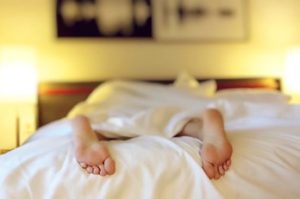Are Sleep Apnea and Drooling Connected?
December 2, 2022
 Snoring is a common sign of sleep apnea, but did you know excessive drooling can be a symptom, too? Everyone drools occasionally, like when battling a stuffy nose, but if it’s a nightly occurrence, sleep apnea may be the culprit. Believe it or not, there’s a direct link between the breathing-related disorder and excess saliva. Here’s what you need to know to determine if you need to see your dentist in Palm Bay for sleep apnea therapy.
Snoring is a common sign of sleep apnea, but did you know excessive drooling can be a symptom, too? Everyone drools occasionally, like when battling a stuffy nose, but if it’s a nightly occurrence, sleep apnea may be the culprit. Believe it or not, there’s a direct link between the breathing-related disorder and excess saliva. Here’s what you need to know to determine if you need to see your dentist in Palm Bay for sleep apnea therapy.
Connection Between Drooling and Sleep Apnea
Drooling occurs when excess saliva runs out of your mouth, which tends to occur more often at night because your swallowing reflexes relax. Hypersalivation can be caused by many issues, like neurological conditions, medications, blocked sinuses, GERD, and sleep apnea.
Sleep apnea is a condition that causes frequent breathing disturbances, most often from an obstruction in the upper airway. As the muscles in your body relax while sleeping, those in the back of your mouth or throat can collapse to block the airway. Each event interrupts your sleep cycle and depletes your body of oxygen.
Many people with sleep apnea breathe through their mouths, which increases the risk of drooling. Unfortunately, signs of sleep apnea may not be as obvious as drooling because they can take many forms, including:
- Loud, chronic snoring
- Waking gasping for air
- Fatigue
- Morning headaches
- Difficulty concentrating or memory loss
- Mood changes, depression, or anxiety
If you have signs of sleep apnea, contact your physician for a sleep study. If they confirm a diagnosis, you’ll be referred to a sleep specialist for treatment.
Treating Obstructive Sleep Apnea
Traditionally, a CPAP is used to treat sleep apnea. A machine delivers gentle air pressure through a mask worn over the mouth or nose to keep the airway open. Although it’s effective, it can be uncomfortable. As an alternative, many people prefer an oral appliance. The custom-fit device holds the tongue and jaw in more comfortable positions to keep the airway open. It can prevent breathing disturbances and stop snoring, but drooling may still be an issue. Your sleep specialist will recommend using a few tips to reduce it, like:
- Sleep Position: You can avoid waking up with a wet spot on your pillow by sleeping on your back.
- Home Remedies: Treat any nasal congestion to make it easier to breathe through your nose.
- BOTOX: Injecting BOTOX into your salivary glands can reduce the overproduction of saliva.
You don’t have to toss and turn at night because of drooling or sleep apnea. With the right changes at home and an oral appliance, you’ll breathe better and sleep comfortably to wake up feeling your best.
About Dr. Christopher Nowacki
Dr. Nowacki earned his dental degree in 2004 and has regularly continued his education in advanced care, like sleep medicine and oral appliance therapy. He is a proud member of various professional organizations, including the American Dental Association. If you need treatment for snoring or sleep apnea, contact our office today to request an appointment.
No Comments
No comments yet.
RSS feed for comments on this post.
Sorry, the comment form is closed at this time.
 Beautiful YouDental
Beautiful YouDental